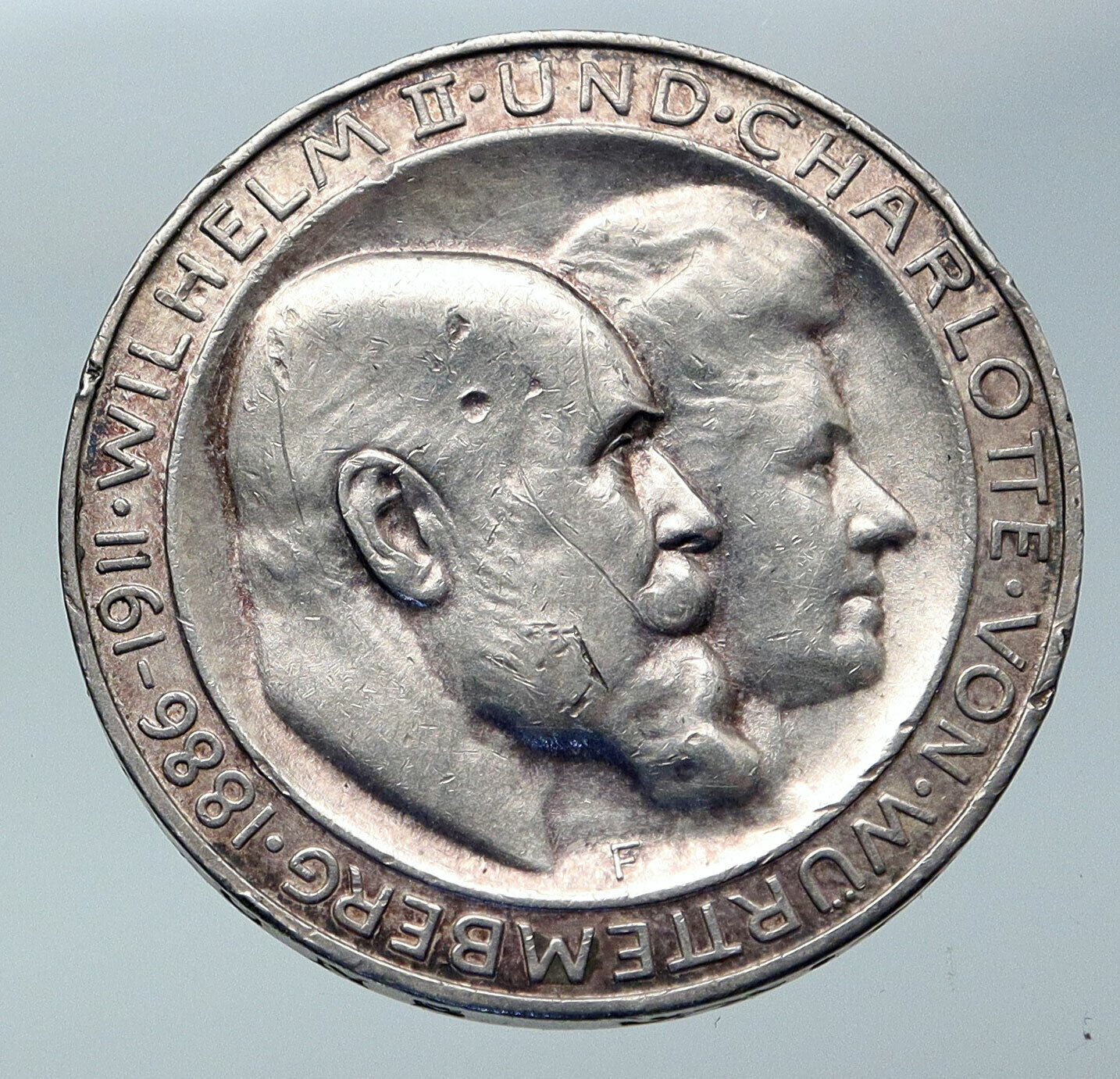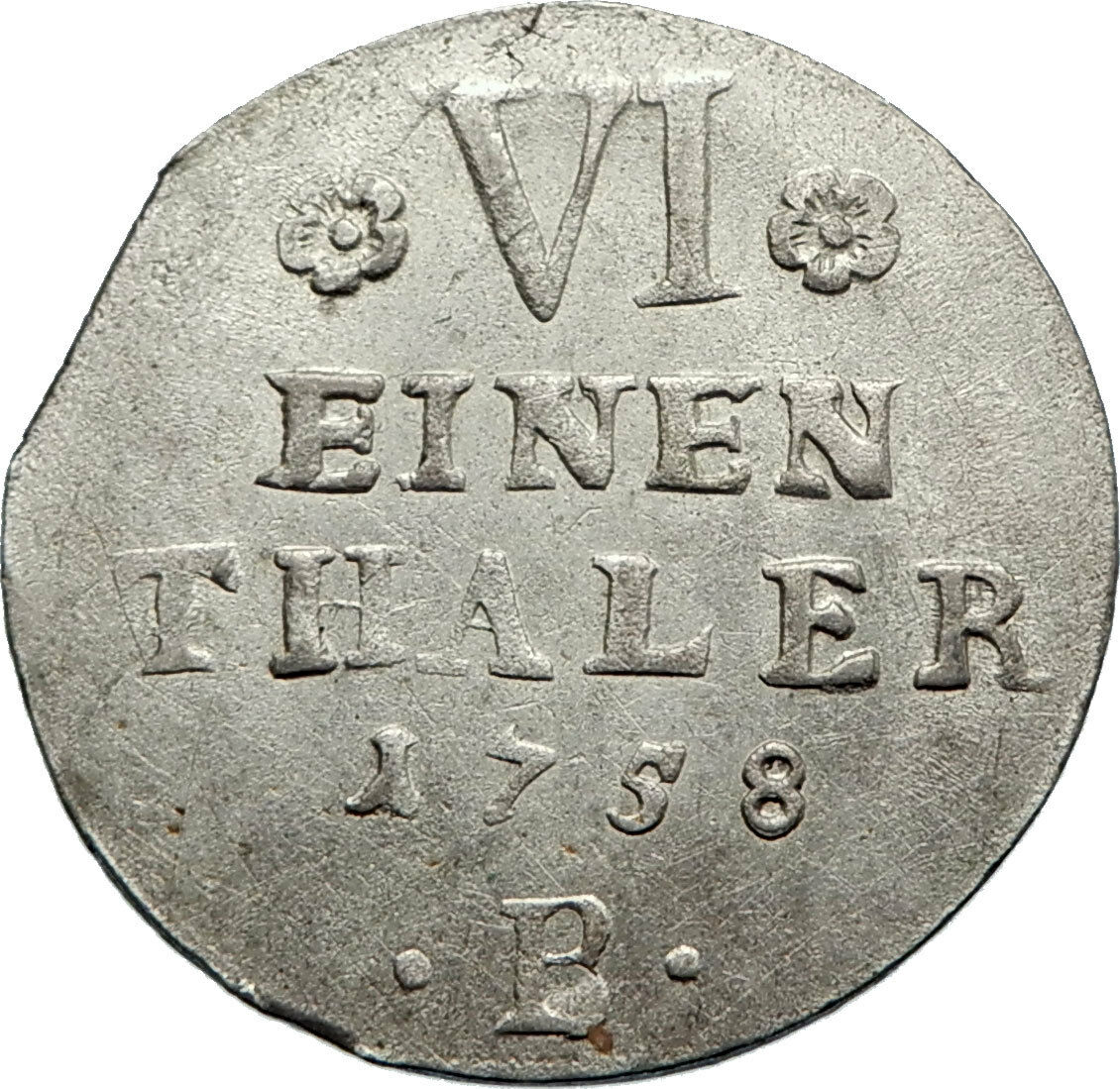|
Germany – German States – Kingdom of Wurttemberg
Charles I – King: (25 June 1864 – 6 October 1891)
1869 Silver 1 Mark 14mm (0.82 grams) 0.166 Silver (0.0044 oz. ASW)
Reference: KM# 612, AKS# 116, AKS# 128, Jäg 1 Wu# 82 (1865-73)
K.WÜRTTEMBERG. SCHEIDEMÜNZE, Crowned Coat-of-arms.
1 KREUZER, Denomination within wreath.
You are bidding on the exact item pictured, provided with a Certificate of Authenticity and Lifetime Guarantee of Authenticity.
 Charles (German: Karl Friedrich Alexander; 6 March 1823 – 6 October 1891) was King of Württemberg, from 25 June 1864 until his death in 1891. Charles (German: Karl Friedrich Alexander; 6 March 1823 – 6 October 1891) was King of Württemberg, from 25 June 1864 until his death in 1891.
Charles was born on 6 March 1823 in Stuttgart as the son of King William I and his third wife Pauline Therese (1800-1873). As the king’s eldest son he became Crown Prince of Württemberg. He studied in Berlin and Tübingen.
On 13 July 1846 Karl married Grand Duchess Olga Nikolaievna of Russia, the daughter of Tsar Nicholas I and Charlotte of Prussia. (Charlotte was a daughter of Frederick William III of Prussia and of Louise of Mecklenburg-Strelitz; she took the name Alexandra Feodorovna upon her marriage into the Russian imperial family.) Karl acceded to the throne of Württemberg upon his father’s death in 1864.
 The couple had no children, perhaps because of Karl’s homosexuality. Karl became the object of scandal several times for his closeness with various men – most notoriously with the American Charles Woodcock, a former chamberlain whom Karl elevated to Baron Savage in 1888. Karl and Charles became inseparable, going so far as to appear together in public dressed identically. The resulting outcry forced Karl to renounce his favorite. Woodcock returned to America, and Karl found private consolation some years later with the technical director of the royal theater, Wilhelm George. The couple had no children, perhaps because of Karl’s homosexuality. Karl became the object of scandal several times for his closeness with various men – most notoriously with the American Charles Woodcock, a former chamberlain whom Karl elevated to Baron Savage in 1888. Karl and Charles became inseparable, going so far as to appear together in public dressed identically. The resulting outcry forced Karl to renounce his favorite. Woodcock returned to America, and Karl found private consolation some years later with the technical director of the royal theater, Wilhelm George.
 In 1870, Olga and Karl adopted Olga’s niece Vera Konstantinovna, the daughter of her brother Grand Duke Konstantin. In 1870, Olga and Karl adopted Olga’s niece Vera Konstantinovna, the daughter of her brother Grand Duke Konstantin.
He sided with Austria in the Austro-Prussian War of 1866, but after the battle of Sadowa concluded a secret military treaty with Prussia, and took part on her side in the Franco-Prussian War of 1870-’71, joining the new German Empire at the close of 1870.
He died, childless, in Stuttgart on 6 October 1891, and was succeeded as King of Württemberg by his sister’s son, William II. He is buried, together with his wife, in the Old Castle in Stuttgart.
  Germany, officially the Federal Republic of Germany is a federal parliamentary republic in western-central Europe. It includes 16 constituent states and covers an area of 357,021 square kilometres (137,847 sq mi) with a largely temperate seasonal climate. Its capital and largest city is Berlin. With 81 million inhabitants, Germany is the most populous member state in the European Union. After the United States, it is the second most popular migration destination in the world. Germany, officially the Federal Republic of Germany is a federal parliamentary republic in western-central Europe. It includes 16 constituent states and covers an area of 357,021 square kilometres (137,847 sq mi) with a largely temperate seasonal climate. Its capital and largest city is Berlin. With 81 million inhabitants, Germany is the most populous member state in the European Union. After the United States, it is the second most popular migration destination in the world.
Various Germanic tribes have occupied northern Germany since classical antiquity. A region named Germania was documented before 100 CE. During the Migration Period the Germanic tribes expanded southward. Beginning in the 10th century, German territories formed a central part of the Holy Roman Empire. During the 16th century, northern German regions became the centre of the Protestant Reformation.
The rise of Pan-Germanism inside the German Confederation resulted in the unification of most of the German states in 1871 into the Prussian-dominated German Empire. After World War I and the German Revolution of 1918-1919, the Empire was replaced by the parliamentary Weimar Republic. The establishment of the Third Reich in 1933 led to World War II and the Holocaust. After 1945, Germany split into two states, East Germany and West Germany. In 1990, the country was reunified.
 In the 21st century, Germany is a great power and has the world’s fourth-largest economy by nominal GDP, as well as the fifth-largest by PPP. As a global leader in several industrial and technological sectors, it is both the world’s third-largest exporter and importer of goods. Germany is a developed country with a very high standard of living sustained by a skilled and productive society. It upholds a social security and universal health care system, environmental protection and a tuition free university education. In the 21st century, Germany is a great power and has the world’s fourth-largest economy by nominal GDP, as well as the fifth-largest by PPP. As a global leader in several industrial and technological sectors, it is both the world’s third-largest exporter and importer of goods. Germany is a developed country with a very high standard of living sustained by a skilled and productive society. It upholds a social security and universal health care system, environmental protection and a tuition free university education.
Germany was a founding member of the European Union in 1993. It is part of the Schengen Area, and became a co-founder of the Eurozone in 1999. Germany is a member of the United Nations, NATO, the G8, the G20, and the OECD. The national military expenditure is the 9th highest in the world. Known for its rich cultural history, Germany has been continuously the home of influential artists, philosophers, musicians, sportsmen, entrepreneurs, scientists and inventors.
|





 Charles (German: Karl Friedrich Alexander; 6 March 1823 – 6 October 1891) was King of Württemberg, from 25 June 1864 until his death in 1891.
Charles (German: Karl Friedrich Alexander; 6 March 1823 – 6 October 1891) was King of Württemberg, from 25 June 1864 until his death in 1891. The couple had no children, perhaps because of Karl’s homosexuality. Karl became the object of scandal several times for his closeness with various men – most notoriously with the American Charles Woodcock, a former chamberlain whom Karl elevated to Baron Savage in 1888. Karl and Charles became inseparable, going so far as to appear together in public dressed identically. The resulting outcry forced Karl to renounce his favorite. Woodcock returned to America, and Karl found private consolation some years later with the technical director of the royal theater, Wilhelm George.
The couple had no children, perhaps because of Karl’s homosexuality. Karl became the object of scandal several times for his closeness with various men – most notoriously with the American Charles Woodcock, a former chamberlain whom Karl elevated to Baron Savage in 1888. Karl and Charles became inseparable, going so far as to appear together in public dressed identically. The resulting outcry forced Karl to renounce his favorite. Woodcock returned to America, and Karl found private consolation some years later with the technical director of the royal theater, Wilhelm George.  In 1870, Olga and Karl adopted Olga’s niece Vera Konstantinovna, the daughter of her brother Grand Duke Konstantin.
In 1870, Olga and Karl adopted Olga’s niece Vera Konstantinovna, the daughter of her brother Grand Duke Konstantin. 
 Germany, officially the Federal Republic of Germany is a federal parliamentary republic in western-central Europe. It includes 16 constituent states and covers an area of 357,021 square kilometres (137,847 sq mi) with a largely temperate seasonal climate. Its capital and largest city is Berlin. With 81 million inhabitants, Germany is the most populous member state in the European Union. After the United States, it is the second most popular migration destination in the world.
Germany, officially the Federal Republic of Germany is a federal parliamentary republic in western-central Europe. It includes 16 constituent states and covers an area of 357,021 square kilometres (137,847 sq mi) with a largely temperate seasonal climate. Its capital and largest city is Berlin. With 81 million inhabitants, Germany is the most populous member state in the European Union. After the United States, it is the second most popular migration destination in the world. In the 21st century, Germany is a great power and has the world’s fourth-largest economy by nominal GDP, as well as the fifth-largest by PPP. As a global leader in several industrial and technological sectors, it is both the world’s third-largest exporter and importer of goods. Germany is a developed country with a very high standard of living sustained by a skilled and productive society. It upholds a social security and universal health care system, environmental protection and a tuition free university education.
In the 21st century, Germany is a great power and has the world’s fourth-largest economy by nominal GDP, as well as the fifth-largest by PPP. As a global leader in several industrial and technological sectors, it is both the world’s third-largest exporter and importer of goods. Germany is a developed country with a very high standard of living sustained by a skilled and productive society. It upholds a social security and universal health care system, environmental protection and a tuition free university education.




